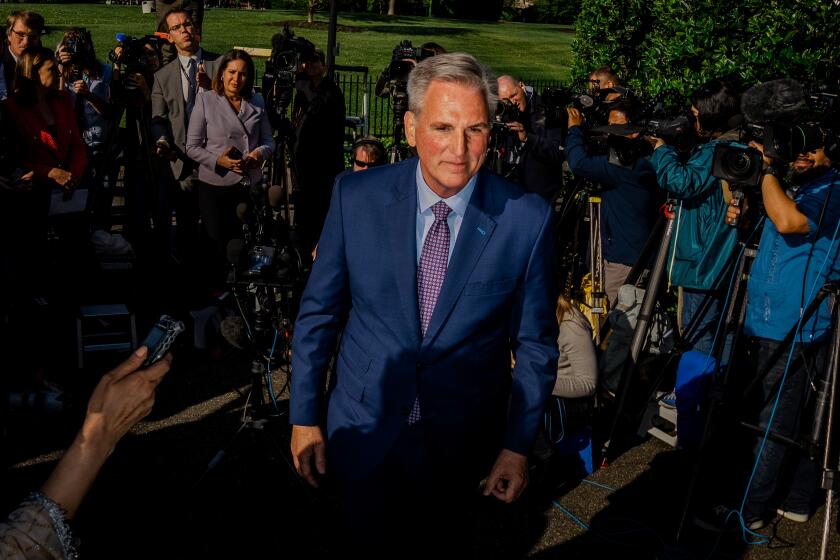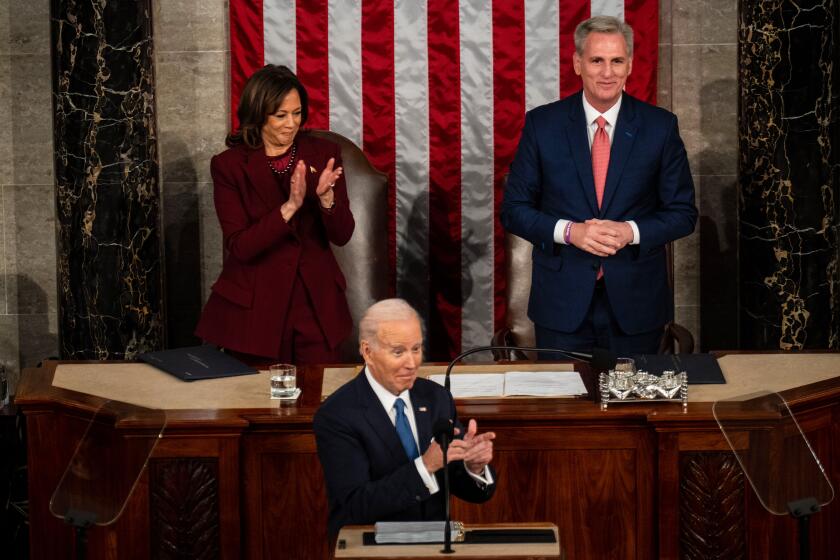Column: Kevin McCarthy’s doomed debt ceiling deal

House Speaker Kevin McCarthy has been strutting his stuff for two weeks since wheedling his slim majority of House Republicans to (barely) pass a bill to raise the debt limit, supposedly strengthening his hand for negotiations with President Biden and Senate Democrats to avoid a first-ever default.
McCarthy should relish his victory march for now. Because that strut is about to become a slog and, ultimately, a surrender of sorts. At stake is the job he fought so hard, and sold his soul, to get.
“We lifted the debt limit. We’ve sent it to the Senate. We’ve done our job,” McCarthy crowed after the 217-215 vote. Note to the speaker: You didn’t lift the debt limit, not without Senate approval and Biden’s signature, and you won’t get either of those for this bill.
Opinion Columnist
Jackie Calmes
Jackie Calmes brings a critical eye to the national political scene. She has decades of experience covering the White House and Congress.
So, no, your job is not done. To get the job done, you will have to compromise with the Democrats.
And that’s McCarthy’s predicament. The handcuffs that House Republicans have put on the speaker will make it almost impossible for him to sign off on a compromise.
Remember, first, that all the struggling underway is simply to get enough Republicans to help avert an economic catastrophe — by raising the debt limit so the nation can keep paying for past spending that presidents and Congresses of both parties racked up for years. In other words, to get Republicans to take an action that should be bipartisan. And nonnegotiable, as Biden says. When Trump was president, Republicans joined Democrats three times to hike the debt limit without drama.
The House passed McCarthy’s debt ceiling bill last month only after he spent days kowtowing to the demands of the most radicalized Republican caucus in history, whose far-right members are the real powers in Kevin’s House.
House Speaker Kevin McCarthy reported no progress after negotiating at the White House with President Biden over an increase in the debt limit to pay the nation’s bills.
The bill would slash domestic programs across the board (the spending cuts are unspecified; such gory details would have cost support) and tighten work requirements for food stamps and Medicaid. It also would repeal Biden’s landmark clean-energy initiatives and expand fossil fuel production.
On top of that, it would increase the debt limit only into next year, setting up the next showdown amid the presidential campaign — what could go wrong?
It’s a radical bill, in other words. And even with his giveaways, McCarthy lost four right-wingers’ votes; two more and he’d have failed. And yet more Republicans are sure to join the naysayers against any deal McCarthy might reach with Biden and the Senate. Some already have said so, all but ensuring that the speaker can’t pass a debt limit hike that actually will become law and not just a political statement.
One hard-liner told Politico that McCarthy promised that he’d oppose any compromise that omits the right-wingers’ provisions. That’s insane. It contradicts the very definition of compromise — give and take.
Don’t blame Biden for a lack of fiscal leadership. Until Republicans drop their opposition to new taxes, neither Medicare nor Social Security should be cut.
Talk about irony: McCarthy sold the debt limit bill by persuading holdouts that it would give him leverage in negotiations with Democrats, by telegraphing Republican unity behind huge spending cuts. Yet if McCarthy can’t change a whit of the House bill, he has virtually no leverage in the talks.
That’s what makes these debt limit negotiations more fraught than any in memory. Democrats know McCarthy is not a negotiating partner who can deliver the votes for a deal, hostage as he is to the radicals in his caucus.
McCarthy’s bargaining position is: “Take our plan, or the nation defaults.” That’s not negotiating; it’s a holdup. Worse, it’s fiscal terrorism.
As for Biden’s stance of “no negotiations over the debt limit” — he’s right in principle. But as a practical matter, his position is all but meaningless in a divided Congress. And politically, it’s a hard sell.
Donald Trump is an abnormal candidate who must not be normalized in some run-of-the-mill Q&A with voters. Can CNN avoid the media’s 2016 mistakes?
Neither he nor Democrats in Congress have been clear enough that they are willing to negotiate over reducing annual deficits, but separate from the debt limit. The distinction is lost on many voters. An Echelon Insights poll found that three-quarters of voters want Biden to bargain over raising the debt ceiling. Also, Democrats have their own internal divisions, and a growing number are calling for Biden to give ground.
Former President Trump, no surprise, stoked the dangerous dynamic on Wednesday during CNN’s ill-considered town hall with him. He said he’d told Republicans that unless they extract “massive cuts” from Democrats, “you’re going to have to do a default.” (Asked why he’d flip-flopped from when he was president and opposed bargaining over the debt limit, Trump — with the kind of honesty about his hypocrisy that fans love — quipped, “Because now I’m not president.”)
His default remark must have deflated McCarthy’s puffed chest. The speaker had to know that Trump, the real leader of House right-wingers, made the already rocky path to some sort of a deal that much rougher.
One more pressure point for the speaker: In recent years, voters have tended to blame Republicans more than Democrats after debt and budget showdowns.
McCarthy is going to have to lead the House in passing a compromise or get out of the way and let a majority coalition of Democrats and responsible Republicans do it. Either approach could mean the end of his speakership in a House where just one member can force a vote to unseat him at any time.
Keep on struttin’, Mr. Speaker, while you can.
More to Read
Get the latest from Jackie Calmes
Commentary on politics and more from award-winning opinion columnist.
You may occasionally receive promotional content from the Los Angeles Times.















